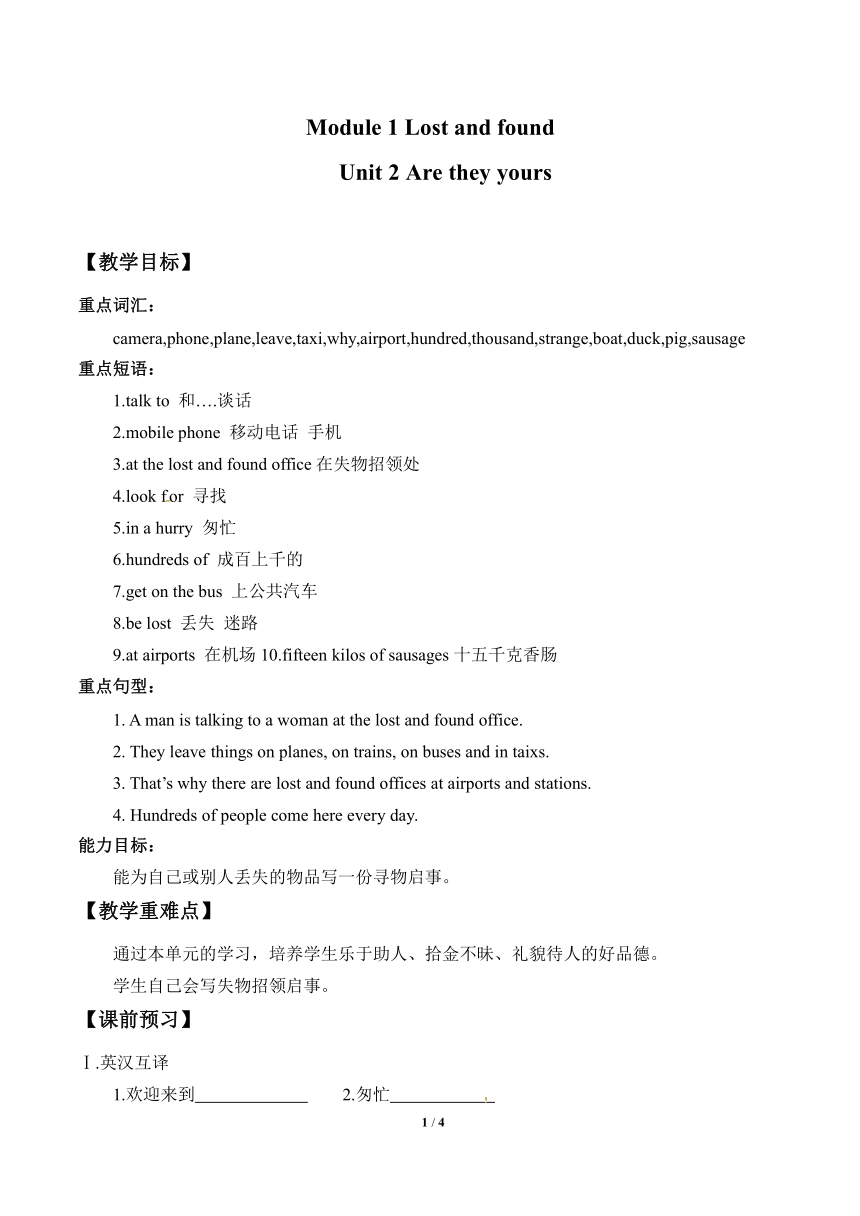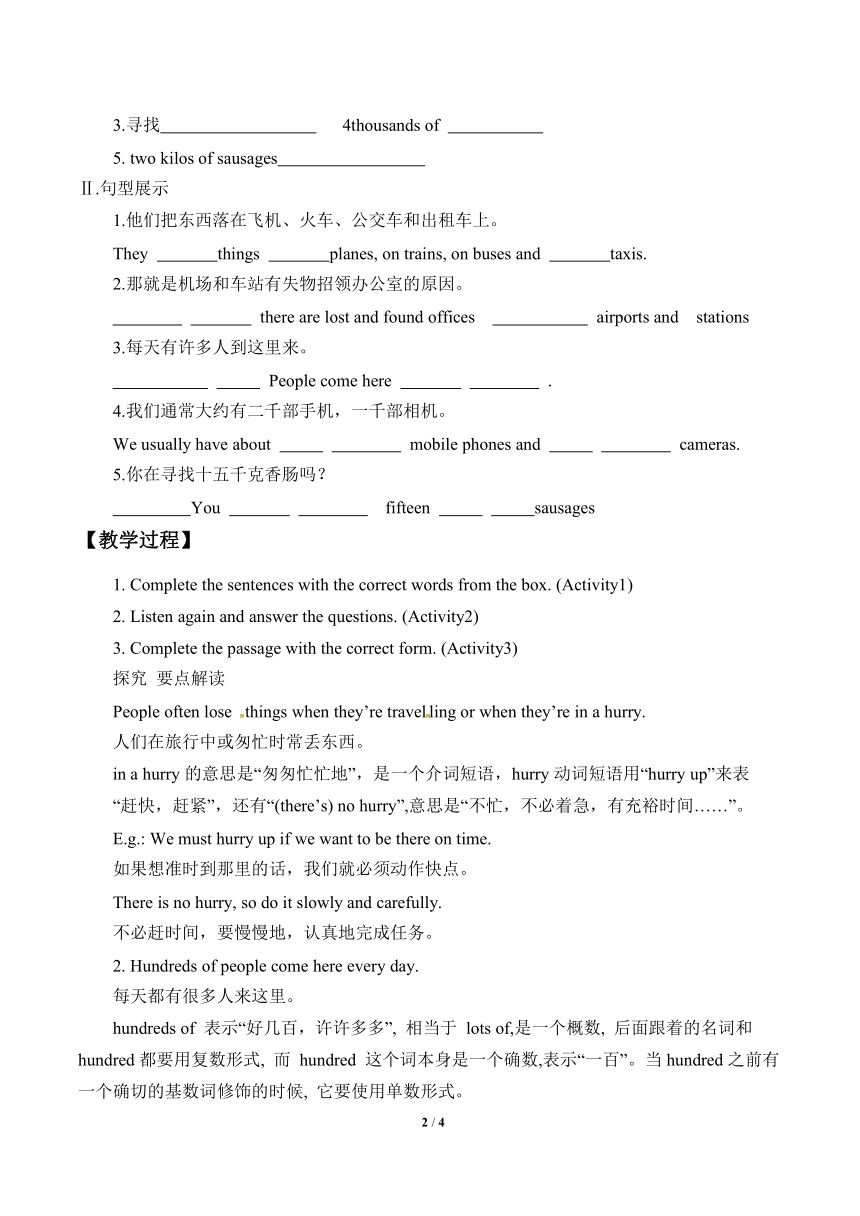Module 1 Lost and found Unit 2 Are they yours?教案
文档属性
| 名称 | Module 1 Lost and found Unit 2 Are they yours?教案 |  | |
| 格式 | docx | ||
| 文件大小 | 23.4KB | ||
| 资源类型 | 教案 | ||
| 版本资源 | 外研版 | ||
| 科目 | 英语 | ||
| 更新时间 | 2022-05-12 20:54:39 | ||
图片预览


文档简介
Module 1 Lost and found
Unit 2 Are they yours
【教学目标】
重点词汇:
camera,phone,plane,leave,taxi,why,airport,hundred,thousand,strange,boat,duck,pig,sausage
重点短语:
1.talk to 和….谈话
2.mobile phone 移动电话 手机
3.at the lost and found office在失物招领处
4.look for 寻找
5.in a hurry 匆忙
6.hundreds of 成百上千的
7.get on the bus 上公共汽车
8.be lost 丢失 迷路
9.at airports 在机场10.fifteen kilos of sausages十五千克香肠
重点句型:
1. A man is talking to a woman at the lost and found office.
2. They leave things on planes, on trains, on buses and in taixs.
3. That’s why there are lost and found offices at airports and stations.
4. Hundreds of people come here every day.
能力目标:
能为自己或别人丢失的物品写一份寻物启事。
【教学重难点】
通过本单元的学习,培养学生乐于助人、拾金不昧、礼貌待人的好品德。
学生自己会写失物招领启事。
【课前预习】
Ⅰ.英汉互译
1.欢迎来到 2.匆忙
3.寻找 4thousands of
5. two kilos of sausages
Ⅱ.句型展示
1.他们把东西落在飞机、火车、公交车和出租车上。
They things planes, on trains, on buses and taxis.
2.那就是机场和车站有失物招领办公室的原因。
there are lost and found offices airports and stations
3.每天有许多人到这里来。
People come here .
4.我们通常大约有二千部手机,一千部相机。
We usually have about mobile phones and cameras.
5.你在寻找十五千克香肠吗?
You fifteen sausages
【教学过程】
1. Complete the sentences with the correct words from the box. (Activity1)
2. Listen again and answer the questions. (Activity2)
3. Complete the passage with the correct form. (Activity3)
探究 要点解读
People often lose things when they’re travelling or when they’re in a hurry.
人们在旅行中或匆忙时常丢东西。
in a hurry的意思是“匆匆忙忙地”,是一个介词短语,hurry动词短语用“hurry up”来表
“赶快,赶紧”,还有“(there’s) no hurry”,意思是“不忙,不必着急,有充裕时间……”。
E.g.: We must hurry up if we want to be there on time.
如果想准时到那里的话,我们就必须动作快点。
There is no hurry, so do it slowly and carefully.
不必赶时间,要慢慢地,认真地完成任务。
2. Hundreds of people come here every day.
每天都有很多人来这里。
hundreds of 表示“好几百,许许多多”, 相当于 lots of,是一个概数, 后面跟着的名词和hundred都要用复数形式, 而 hundred 这个词本身是一个确数,表示“一百”。当hundred之前有一个确切的基数词修饰的时候, 它要使用单数形式。
e.g.: two hundred students 两百个学生 hundreds of teachers好多老师
3. They leave things on planes, on trains, on buses and in taxis.
他们把东西落在飞机上、火车、公交车和出租车上。
自主领悟 leave 作动词,意为“剩下,落下,遗忘”。Leave(忘记)+sth.+地点 把某物王忘在某地。
e.g.: Don’t leave your keys in your room.不要把你的钥匙忘在房间里。
归纳拓展
①leave for +地点 动身去某地。e.g.: My dad will leave for Beijing tomorrow.
②leave(留下)sb.by oneself/leave sb. alone把某人单独留下。
对应练习
①玲玲,不要把你的书忘在家里!Lingling, don’t your books .②我的儿子太小,我不能把他单独留下。My son is too young. I can’t alone.
③有数百只猴子在山上。他们很可爱。There are in the mountain. They are very lovely.
Two students went to the camp in the country during the summer holiday
A hundred B. hundreds C. hundreds of D. hundred of
【达标练习】
Ⅰ.句型转换。
1. They are looking for the camera. (对划线部分提问)
2. This book is Tony’s. (对划线部分提问)
3. They are mine. (改为一般疑问句)
?
4. They are Betty and Tony. (改为同义句)
names are Betty and Tony.
5. This is my desk. (改为一般疑问句)
this desk
Ⅱ.聚焦历年中考
1. Some scientists think that it will take of years to make robots do most work for humans.
A. hundreds B. hundred C. thousand
2. After the Asian Games, people came to Guangzhou for a visit during holidays.
A thousand B. thousands C. thousand of D. thousands of
1 / 4
Unit 2 Are they yours
【教学目标】
重点词汇:
camera,phone,plane,leave,taxi,why,airport,hundred,thousand,strange,boat,duck,pig,sausage
重点短语:
1.talk to 和….谈话
2.mobile phone 移动电话 手机
3.at the lost and found office在失物招领处
4.look for 寻找
5.in a hurry 匆忙
6.hundreds of 成百上千的
7.get on the bus 上公共汽车
8.be lost 丢失 迷路
9.at airports 在机场10.fifteen kilos of sausages十五千克香肠
重点句型:
1. A man is talking to a woman at the lost and found office.
2. They leave things on planes, on trains, on buses and in taixs.
3. That’s why there are lost and found offices at airports and stations.
4. Hundreds of people come here every day.
能力目标:
能为自己或别人丢失的物品写一份寻物启事。
【教学重难点】
通过本单元的学习,培养学生乐于助人、拾金不昧、礼貌待人的好品德。
学生自己会写失物招领启事。
【课前预习】
Ⅰ.英汉互译
1.欢迎来到 2.匆忙
3.寻找 4thousands of
5. two kilos of sausages
Ⅱ.句型展示
1.他们把东西落在飞机、火车、公交车和出租车上。
They things planes, on trains, on buses and taxis.
2.那就是机场和车站有失物招领办公室的原因。
there are lost and found offices airports and stations
3.每天有许多人到这里来。
People come here .
4.我们通常大约有二千部手机,一千部相机。
We usually have about mobile phones and cameras.
5.你在寻找十五千克香肠吗?
You fifteen sausages
【教学过程】
1. Complete the sentences with the correct words from the box. (Activity1)
2. Listen again and answer the questions. (Activity2)
3. Complete the passage with the correct form. (Activity3)
探究 要点解读
People often lose things when they’re travelling or when they’re in a hurry.
人们在旅行中或匆忙时常丢东西。
in a hurry的意思是“匆匆忙忙地”,是一个介词短语,hurry动词短语用“hurry up”来表
“赶快,赶紧”,还有“(there’s) no hurry”,意思是“不忙,不必着急,有充裕时间……”。
E.g.: We must hurry up if we want to be there on time.
如果想准时到那里的话,我们就必须动作快点。
There is no hurry, so do it slowly and carefully.
不必赶时间,要慢慢地,认真地完成任务。
2. Hundreds of people come here every day.
每天都有很多人来这里。
hundreds of 表示“好几百,许许多多”, 相当于 lots of,是一个概数, 后面跟着的名词和hundred都要用复数形式, 而 hundred 这个词本身是一个确数,表示“一百”。当hundred之前有一个确切的基数词修饰的时候, 它要使用单数形式。
e.g.: two hundred students 两百个学生 hundreds of teachers好多老师
3. They leave things on planes, on trains, on buses and in taxis.
他们把东西落在飞机上、火车、公交车和出租车上。
自主领悟 leave 作动词,意为“剩下,落下,遗忘”。Leave(忘记)+sth.+地点 把某物王忘在某地。
e.g.: Don’t leave your keys in your room.不要把你的钥匙忘在房间里。
归纳拓展
①leave for +地点 动身去某地。e.g.: My dad will leave for Beijing tomorrow.
②leave(留下)sb.by oneself/leave sb. alone把某人单独留下。
对应练习
①玲玲,不要把你的书忘在家里!Lingling, don’t your books .②我的儿子太小,我不能把他单独留下。My son is too young. I can’t alone.
③有数百只猴子在山上。他们很可爱。There are in the mountain. They are very lovely.
Two students went to the camp in the country during the summer holiday
A hundred B. hundreds C. hundreds of D. hundred of
【达标练习】
Ⅰ.句型转换。
1. They are looking for the camera. (对划线部分提问)
2. This book is Tony’s. (对划线部分提问)
3. They are mine. (改为一般疑问句)
?
4. They are Betty and Tony. (改为同义句)
names are Betty and Tony.
5. This is my desk. (改为一般疑问句)
this desk
Ⅱ.聚焦历年中考
1. Some scientists think that it will take of years to make robots do most work for humans.
A. hundreds B. hundred C. thousand
2. After the Asian Games, people came to Guangzhou for a visit during holidays.
A thousand B. thousands C. thousand of D. thousands of
1 / 4
同课章节目录
- Module 1 Lost and found
- Unit 1 Whose bag is this?
- Unit 2 Are they yours?
- Unit 3 Language in use
- Module 2 What can you do ?
- Unit 1 I can play the piano
- Unit 2 I can run really fast
- Unit 3 Language in use
- Module 3 Making plans
- Unit 1 What are you going to do at the weekends?
- Unit 2 We're going to cheer the players.
- Unit 3 Language in use
- Module 4 Life in the future
- Unit 1 Everyone will study at home
- Unit 2 Every family will have a small plane.
- Unit 3 Language in use
- Module 5 Shopping
- Unit 1 What can I do for you?
- Unit 2 You can buy everything on the Internet
- Unit 3 Language in use
- Module 6 Around town
- Unit 1 Could you tell me how to get to the Nationa
- Unit 2 The London Eye is on your right.
- Unit 3 Language in use
- Revision module A
- Module 7 My past life
- Unit 1 I was born in a small village.
- Unit 2 I was born in Quincy.
- Unit 3 Language in use
- Module 8 Story time
- Unit 1 Once upon a time….
- Unit 2 Goldilocks hurried out of the house.
- Unit 3 Language in use
- Module 9 Life history
- Unit 1 He left school and began work at the age of
- Unit 2 He decided to be an actor.
- Unit 3 Language in use
- Module 10 A holiday journey
- Unit 1 What did you do?
- Unit 2 This morning we took a walk.
- Unit 3 Language in use
- Module 11 Body language
- Unit 1 They touch noses!
- Unit 2 Here are some ways to welcome them.
- Unit 3 Language in use
- Module 12 Western music
- Unit 1 It's so beautiful!
- Unit 2 Vienna is the centre of European classical
- Unit 3 Language in use
- Revision module B
